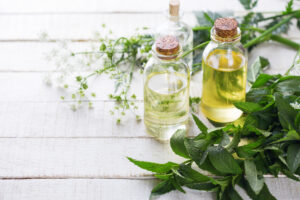Because eczema is an umbrella term for a number of different conditions, when we talk about the causes of eczema, it’s often in very general terms. However, for most types of eczema, researchers believe that:
a) people’s genes make them susceptible, and
b) flare-ups have triggers – and that’s where the environmental factors come in.
The main job of the immune system is to identify anything that is not meant to be there and react accordingly. These reactions can be anything from producing antibodies, or sending cells to clean up damaged tissue and engulf bacteria, viruses, and even dust. It can also launch an inflammatory response. The immune system can also make mistakes and start to fight healthy tissues.
Inflammation involves increasing the blood supply to the affected area (in this case the skin), and opening up capillaries so that white blood cells can infiltrate the local tissue. It also triggers the release of chemicals that make an area more sensitive.
Sometimes the immune response is out of proportion to the trigger. This can happen fast, resulting in a life-threatening allergic reaction, that creates a lot of swelling – especially around the mouth and throat. And sometimes it happens less dramatically, but over a longer period of time, and that just leads to conditions like eczema. I’m no doctor, but eczema is definitely the less scary of the two!
So, for people with eczema, their over-active immune system causes inflammation in the deeper layers of their skin. Redness comes on because more blood is being directed to the area, and other inflammatory processes cause tenderness and itching. Discovering what triggers immune sensitivity is vital to reducing the symptoms.
Can Your Environment Affect Eczema?
The answer to this question is a resounding yes! Chemical irritants that can make eczema worse are discussed separately here However, the natural world also contains irritants, and the most common ones are discussed below:
Climate
In summer, people with eczema can suffer from “prickly heat”. This sensation occurs when they are too hot or sweaty. In hot weather, your body sends blood to the skin surface to promote cooling and the resulting extra fluid causes the skin to tighten. Micro-fissures in the skin allow moisture to escape, cooling you down. Unfortunately, this also dries your skin, and provides an opportunity for bacteria colonize the area. Hello, eczema. Central heating can have this effect, too.
Skin is also at risk of drying when the outdoor humidity drops and the air is cold – in winter. These conditions case the water in your skin to evaporate faster, which can also trigger an eczema flare-up.
Allergens
Allergens are anything that causes an allergic reaction. They vary: one person’s allergen is another person’s peanut. As you know, seasonal pollen is very difficult to avoid. Pollen is produced by grasses, trees, flowers, and weeds. It is everywhere, even in urban environments. People do find some respite by the sea – which is about the only pollen-free zone!
The peak time of suffering for people with asthma and hay fever is also likely to be a challenging time for those with eczema. Allergens can trigger inflammatory responses in your body, so limiting the allergens in your environment can help to reduce your eczema.
Dust mites are another allergen. They are tiny creatures that survive by eating the skin fragments shed by humans and animals (dust mites aren’t choosy!). A nice name for these skin fragments is dander. It’s not pretty to think about, but it’s relevant, because eczema flare-ups can be caused by the ‘saliva’ enzyme that the mites use to break down their food before they eat it. If these enzymes come into contact with damp skin, an eczema outbreak, or worsening symptoms, are more likely. Children are particularly at risk here.
Pet dander is also an allergen and is a common trigger for eczema. Proteins in pet urine and saliva can also cause a flare-up.
If you’re already allergic to certain animals, pets can certainly worsen symptoms of eczema.
It’s worth noting that kids who grow up with pets are less likely to get eczema when they’re older. According to “the hygiene hypothesis,” exposure to germs at a young age strengthens the immune system, and it will eventually stop reacting to allergens encountered in childhood. For example, one treatment for bee sting allergy is to sting the person until the immune system stops reacting. However, this should only be done under close medical supervision in case the person develops a full-blown allergic reaction.
Pollution
The correlation between pollution and eczema could do with more research, but it is noteworthy that the most polluted areas are densely-populated urban areas, where rates of eczema are higher than in rural environments
Mould
Mould can come in the form of tiny fungi and their spores, which are not always visible. Humid and damp environments, both indoors and outdoors, are a breeding-ground for mould, and this can exacerbate eczema.
Water
If you live in a hard-water area, this may make eczema worse. Theories suggest that the water’s pH, calcium carbonate, or filtration chemicals may be to blame.
The internal environment
Stress can alter the way your immune system functions. The internal environment of the body is also worth considering, and we will discuss the effects of stress and hormones on eczema in another article coming soon.
All these environmental factors can either trigger a flare-up, make symptoms more severe, or make them last longer. Fortunately, there are ways of reducing the impact of these environmental triggers without wrapping yourself in hermetically sealed plastic or moving home! I’m not a doctor, but I think your doctor will agree, that eliminating as many triggers as possible and taking good care of your skin will be beneficial.
Right! I’m off to get some fresh air and hoover the cat!




